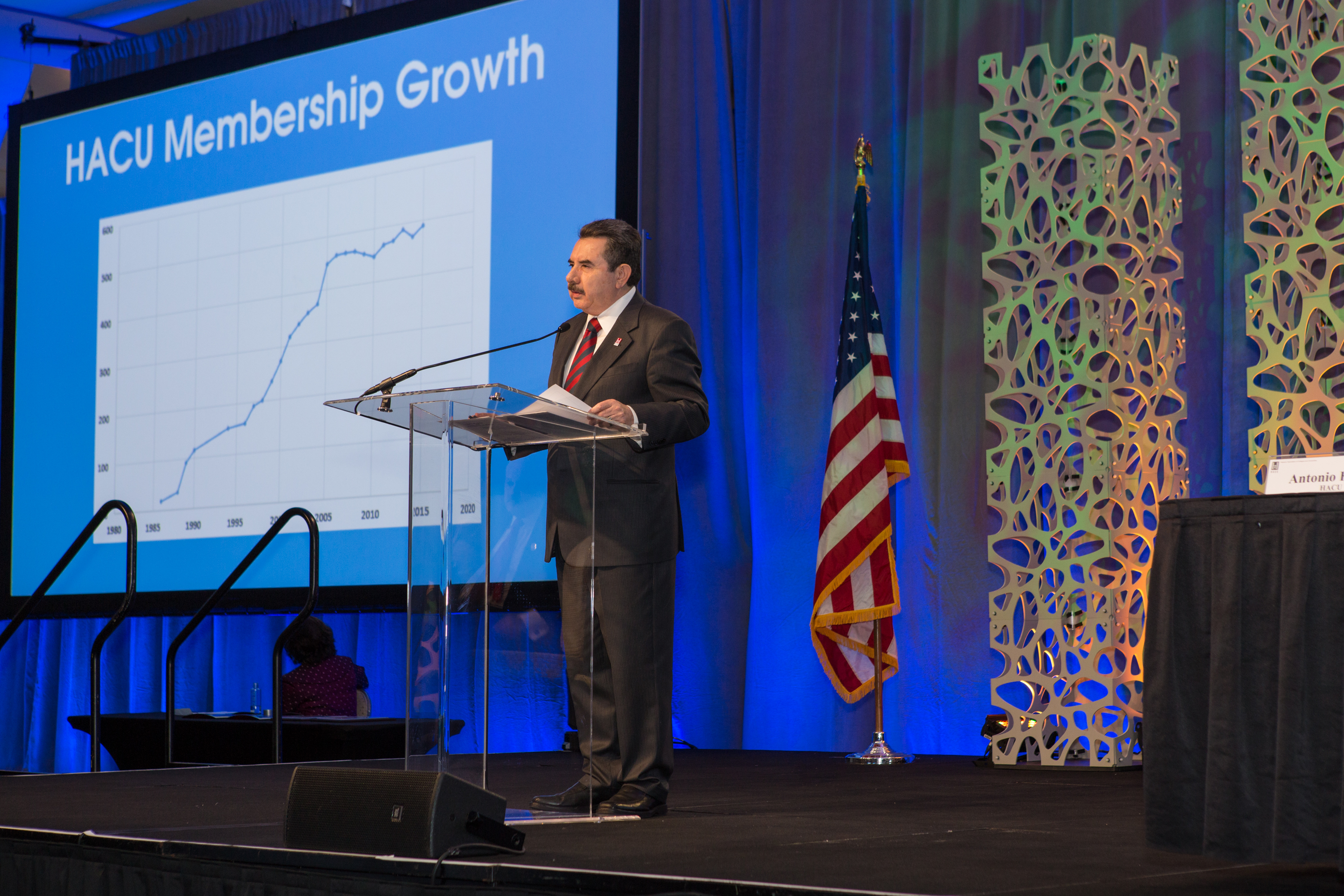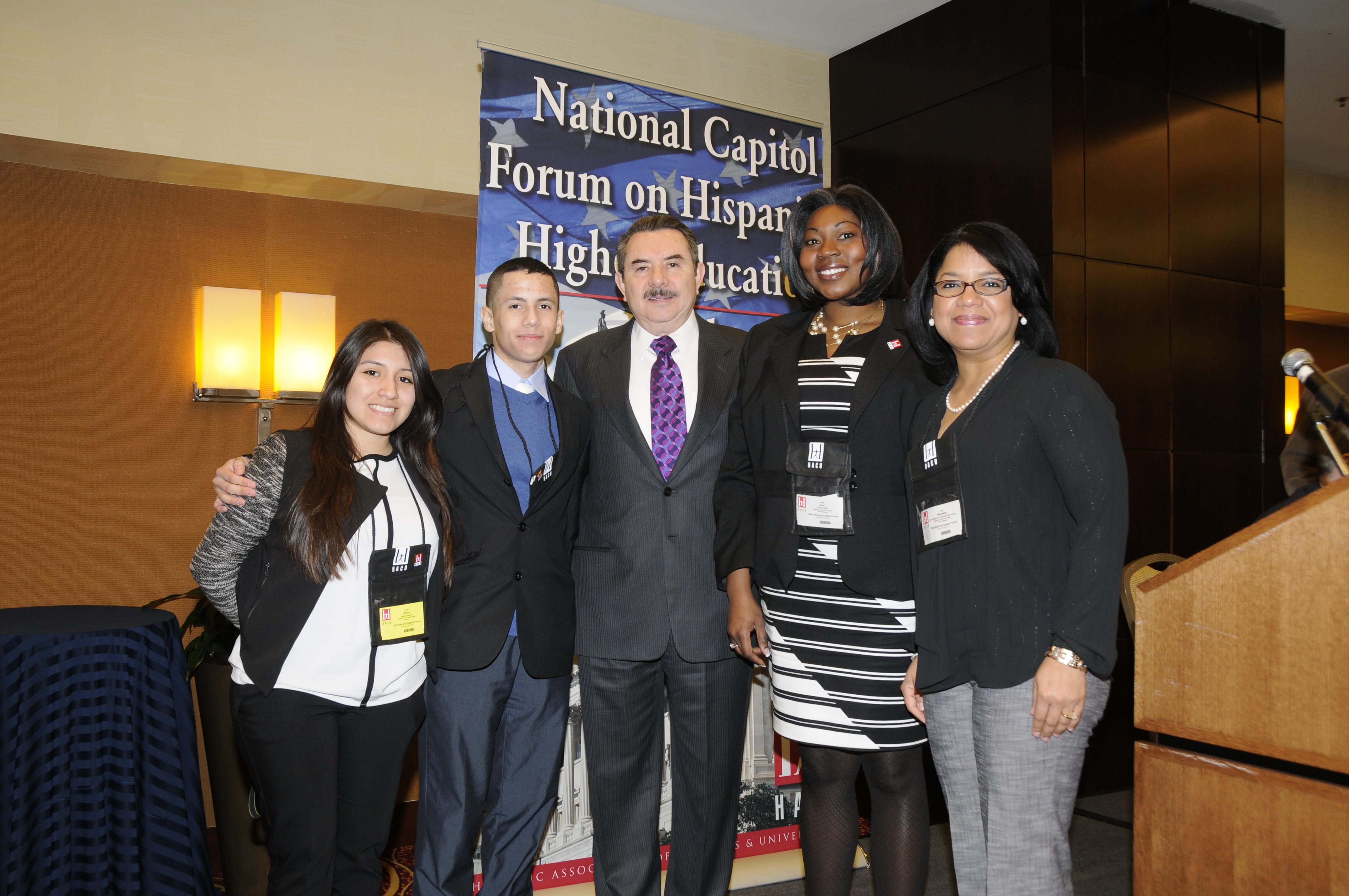Marivel Resendiz
The Voice of Hispanic Higher Education
Feb. 26, 2016
Flores celebrates 20 years of service with HACU
 In the small, rural community in Central Mexico where Antonio Flores grew up, fifth grade was the highest level of education. His parents only made it to the second grade.
In the small, rural community in Central Mexico where Antonio Flores grew up, fifth grade was the highest level of education. His parents only made it to the second grade. Understanding the importance of an education, Flores’ parents allowed him to move to the city with a family of teachers to continue his education.
“The teachers opened my eyes and showed me there
was a different world – a much bigger world – than where I was growing up,” Flores said. “Living with them in the city forged new visions and possibilities farther than elementary school.”
With the guidance of mentors along the way, Flores continued his education and later obtained undergraduate degrees in Mexico, and a master’s and Ph.D. in the U.S., all which led him to the Hispanic Association of Colleges and Universities, where he has served as the president and CEO for the past 20 years.
In 1995, when HACU was seeking its third president and CEO, Flores was approached by a California university president and asked if he was interested in a nomination for the position.
“Once I realized HACU was not just another organization but the organization that really could make a major difference for higher education opportunities in our community and for the institutions they represented, that really got me fired up,” Flores said.
Flores was motivated by the opportunity to work on policy and legislation that would support Hispanic-Serving Institutions (HSIs) and Hispanic higher education success across the nation.
“Federal legislative changes have a national impact,” Flores said. “So, whenever a law is amended, that provides resources and opportunities for our institutions and our students. That really is something that gives me a great deal of satisfaction.”
Since joining HACU, Flores has helped the association increase annual federal funding for HSIs, nearly tripled the association’s membership, expanded its representation internationally, and implemented and improved programs and partnerships to offer a variety of internship and scholarship opportunities. Flores says every HACU initiative is tied to Hispanic student success.
“When I see the students who come from families without an education or from underprivileged backgrounds in terms of economical conditions, what they do achieve is amazing when they’re up against so many odds,” Flores said. “I relate to that very much, because that’s the story of my life.”
 The Hispanic population is growing at record-breaking rates and the country is experiencing a demographic shift. According to an IHS Global Insight study, Hispanics will account for nearly 75 percent of the nation’s workforce growth between 2020 and 2034. Flores said Hispanics are becoming the backbone of this country’s future.
The Hispanic population is growing at record-breaking rates and the country is experiencing a demographic shift. According to an IHS Global Insight study, Hispanics will account for nearly 75 percent of the nation’s workforce growth between 2020 and 2034. Flores said Hispanics are becoming the backbone of this country’s future.Currently 1 out of every 3 students in kindergarten through 12th grade is Hispanic, leading to an even higher Hispanic college student enrollment within the next decade. However, at the same time, Flores says there is an under attainment of degrees, which could adversely affect the future of the nation.
“The economy of the nation is constantly requiring more knowledge and skills than before,” Flores said. “Those skills are obtained through higher education. The writing is on the wall, and therefore, we need to dramatically enhance the success rates of Latinos for our entire country to maintain its standard of living and prosperity.”
Tremendous progress has been made in the past 30 years to serve Hispanics in higher education, but Flores said HACU will continue the momentum to expand its reach and effectiveness to improve and increase funding for HSIs.
“There are more programs that need to be tackled,” Flores said. “It’s an ongoing effort and I hope many more pieces of legislation will be opened to HSIs and to Hispanics in higher education. HSIs remain sorely under-resourced and only get 68 cents for every federal dollar going to the remaining higher education institutions.”
And as more HSIs emerge, Flores said he hopes institutions will embrace their identity as HSIs that enroll a high number of Hispanics and truly become Hispanic-“serving.”
“I hope HSIs put their identity at the forefront of their messaging an image so that the community they serve and students they serve are uplifted,” Flores said. “As an association, we will be there to assist them and provide tools they need to achieve that.”
